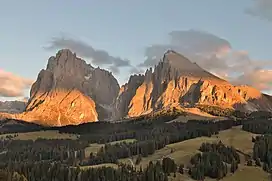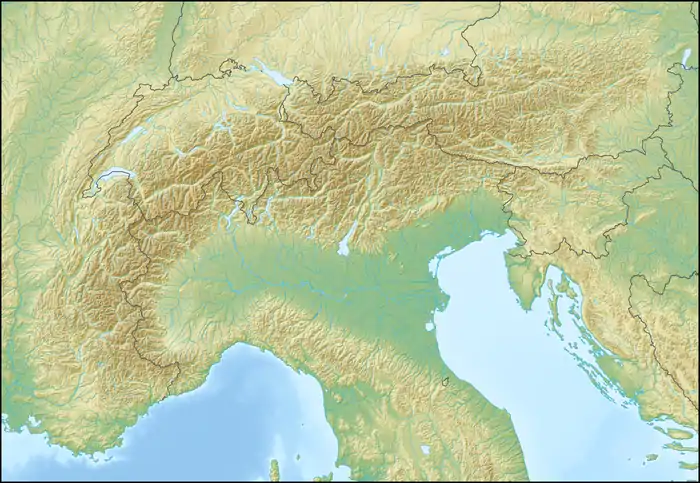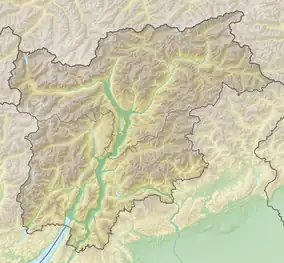| Seiser Alm | |
|---|---|
| Alpe di Siusi | |
 Seiser Alm with the mountains of Langkofel Group in the background | |
 Seiser Alm Location of Seiser Alm in Northern Italy  Seiser Alm Seiser Alm (Trentino-Alto Adige/Südtirol) | |
| Floor elevation | 1,700 m (5,600 ft) |
| Area | 52 km2 (20 sq mi) |
| Geography | |
| Country | Italy |
| State/Province | Trentino-Alto Adige |
| Population center | Bolzano |
| Coordinates | 46°32′28″N 11°38′40.99″E / 46.54111°N 11.6447194°E |
Seiser Alm (Italian: Alpe di Siusi, Ladin: Mont Sëuc) is a Dolomite plateau and the largest high-elevation Alpine meadow (German: Alm) in Europe. Located in Italy's South Tyrol province in the Dolomites mountain range, it is a major tourist attraction, notably for skiing and hiking.
Geography
It is located in the western part of the Dolomites and has an elevation between 1,680 meters (5,510 ft) and 2,350 meters (7,710 ft); it extends for 52 square kilometers (20 sq mi) between Val Gardena to the north, the Sassolungo Group to the northeast, and the Sciliar massif to the southeast, which with its unmistakable profile is one of the best-known symbols of all the Dolomites. Given the vastness of the area, from here it is possible to admire a large number of mountain groups: among others, the Sella Group, the Rosengarten group, and the Marmolada.
It is the largest mountain pasture in Europe. It is divided into numerous plots reserved to grazing or from which farmers obtain hay for their farms at lower elevations.
The eastern part has been included in Sciliar Natural Park since 1975.
Surrounding peaks
The pasture offers a panoramic view that includes (from north, in a clockwise direction): Peitlerkofel (Sass de Putia, 1,873 m or 6,145 ft), the Odle and the Puez groups (3,025 m or 9,925 ft), the Gran Cir, the Sella group (3,152 m or 10,341 ft), Langkofel (Sassolungo, 3,181 m or 10,436 ft) and Plattkofel (Sassopiatto, 2,995 m or 9,826 ft), the Marmolada (3,343 m or 10,968 ft), the Pala group (Pale di San Martino, 3,192 m or 10,472 ft), the Vajolet Towers (2,821 m or 9,255 ft) the Rosengarten group (Catinaccio, 2,981 m or 9,780 ft) with the peak of the Kesselkogel (Catinaccio d'Antermoia, 3,002 m or 9,849 ft) and the Schlern (Sciliar, 2,450 m or 8,040 ft).
Classification
The SOIUSA system considers the plateau as an alpine group with the following classification:
- Main part: Eastern Alps
- Major sector: South-Eastern Alps
- Section: Dolomites
- Subsection: North-Western Dolomites
- Supergroup: Gardena's Dolomites
- Group: Seiser Alp Group
- Code: II/C-31. III-A.3
It also attributes to the plateau the three following subgroups:
- Subgroup A: Palancia-Cresta di Siusi ridge
- Subgroup B: Dorsal Denti di Terra Rossa-Punta d'Oro-Piz ridge
- Subgroup C: Dorsal Bulacia-Salames-Col di Rende ridge
 Langkofel Group (Italian: Gruppo del Sassolongo) seen from Seiser Alm during winter.
Langkofel Group (Italian: Gruppo del Sassolongo) seen from Seiser Alm during winter. View from the plateau
View from the plateau
Further reading
- Alberti, Alberto (1975). "Sodium-rich dachiardite from Alpe di Siusi, Italy". Contributions to Mineralogy and Petrology. 49 (1): 63–6. Bibcode:1975CoMP...49...63A. doi:10.1007/BF00371079. S2CID 94886754.
- Keim, Lorenz (2008). "Geologie im Gebiet Schlern-Seiser Alm: vom Tethysmeer zum Gebirge" [Geology in the Schleern-Seiser Alm area: from the Tethyan Sea to mountain building]. Gredleriana (in German). 8: 25–46. Archived from the original on 2016-06-26.
External links
![]() Media related to Seiser Alm at Wikimedia Commons
Media related to Seiser Alm at Wikimedia Commons
